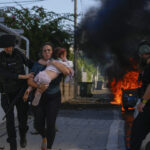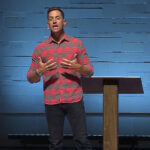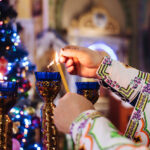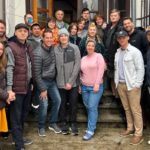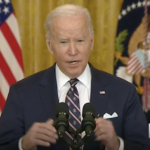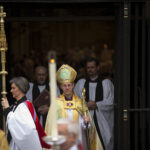
GAZA CITY, Gaza Strip (BP) – Palestinian Christian and former Gaza Baptist Church pastor Hanna Massad first heard the Gospel as a teenager when his aunt Elaine Trazy took him to the church founded in 1954 by Southern Baptist missionaries.
Massad confesses he “really doesn’t have the words” to describe his grief upon learning that Trazy was killed Oct. 19 at age 80 when Israel hit St. Porphyrios Greek Orthodox Church while striking a nearby Hamas target in the Israel-Hamas war.
“She’s very dear to us and it’s very sad,” Massad told Baptist Press.

Trazy, a retired schoolteacher and headmaster, was among 18 Christians and two others killed in the air strike as hundreds sheltered at St. Porphyrios and the Holy Family Roman Catholic Church for safety.
“The ceiling of (a building on the church compound) fell on the people while they slept. And some were not able to run. Even though Israel sent a warning with a small missile,” Massad said, “I’ve been told they just had about five minutes or so.”
Families mourned the 18 in one service, Massad said, including three siblings all under the age of 13.
“Almost half of the population in Gaza are children,” he said, “all of them created in the image of God.”
Despite Israel’s warning to flee Gaza in advance of the current ground attack, “where is there to go?” Massad posed. “There’s no safe place in Gaza.
“Even in the church compound, this is what happened to them. This is what makes you feel so sad deep inside, when you have 8,000-9,000 now or so (civilian fatalities in Gaza). And they tell you 40 percent of the people who have been killed are children and women. And they continue.
“I think there’s a better way than this.”
Massad was last in Gaza in mid-September, two weeks before Hamas struck Israel by surprise, killing an estimated 1,400 civilians and soldiers and taking at least 240 hostages, by latest U.S. estimates, including some Americans.
“What happened to Israel is horrible and it shouldn’t have happened,” he said. “I love the Jewish people.”
A month into the war, Israel completely surrounds Gaza City, essentially separating Gaza into northern and southern regions, The New York Times reported Nov. 6. More than 10,000 people have died in Gaza, including 4,100 children and 2,600 women, the Hamas-run Health Ministry reported Nov. 6. More than 2,000 others are missing and perhaps buried under rubble, the ministry said. It has not been reported whether Americans are among the dead in Gaza, but at least 31 Americans were killed in Hamas’ Oct. 6 attack on Israel, the White House has reported.
More than 300 Americans and their family members have managed to leave Gaza, Jonathan Finer, U.S. deputy natural security advisor, said Nov. 5 on “Face the Nation,” but a number remain. About 400 Americans and their family members, amounting to 1,000 people, were trying previously to leave the war zone, U.S. Secretary of State Anthony Blinken said Nov. 2.
Massad was the first local minister to pastor Gaza Baptist Church. He led the congregation 12 years, moving to Jordan in 2007 as persecution of Christians in Gaza grew under the hands of Hamas. Today, he visits Gaza and Jordan three times a year as founding president of the Christian Mission to Gaza, an evangelistic and humanitarian outreach to Christians, refugees, orphans and widows.
About 900 Christians remain in Gaza after many fled Christian persecution when Hamas kidnapped and killed a Gaza Baptist youth pastor in 2007 as Hamas battled Fatah for control of the West Bank.
Massad continues weekly Sunday Zoom worship with Palestinian Christians and others in the region, although Christians in Gaza have not been able to log in during the war. Last Sunday, Massad said, about 30 Christians long displaced from the region logged in.
“I have almost daily communication with the Christian community and the leaders in the church,” he said, as he continues to minister to the church of about 60 with a team of about five ministers. Gaza Baptist has been without a pastor a few years.
“I usually share with my brothers and sisters in Christ (that) I love the Jewish people, but I hope and pray also there will be a place in your heart to love the Palestinians as well,” he said, “because all of us are created in the image of God, and we see God in each other as we look to one another.”
Massad views the war from a historical perspective dating to the 1917 Balfour Declaration of World War I, when Britain pledged to establish in Palestine a permanent home for the Jewish people. At that time, the population of the region was about 5-10 percent Jewish, Massad said, but more Jewish people relocated to Palestine after World War I. Conflicts escalated between the two ethnic groups, sparking with the 1947 Arab-Israeli War and the 1948 establishment of the Israeli state.
“I’m 63 years old now. I grew up in Gaza and my father went through the occupation,” he said. “And I experienced humiliation during the Israeli occupation.”
The establishment of the Israeli state resulted in 700,000 Palestinian refugees, Massad said, including about 55,000 Christians. Massad said he has documents to prove his extended family, who were Orthodox Christians, lost about 67,000 square meters of land in the conflict.
“The reason I’m sharing this is for people to see the whole picture, for people to see the other side of the coin,” he said, “because things are not always black and white.
“Some people say God gave the land to the Jewish people and get over it,” he said. “I believe the Scripture and all of that, but in the same time the question is really how far back in history do you want to go to solve this conflict?”
Christians should consider their ultimate example of Jesus in finding an intelligent response to the war that doesn’t include continually killing civilians, Massad believes. He favors a two-state solution.
Living as God has called Christians to live is most important to Massad.
“We have a higher call,” he said. “The higher call is not a piece of land. The higher call is to implement God’s call in our lives.”
–30–


